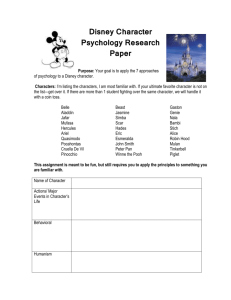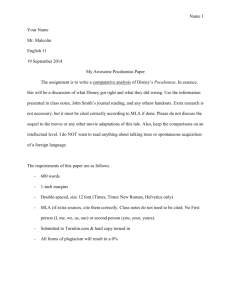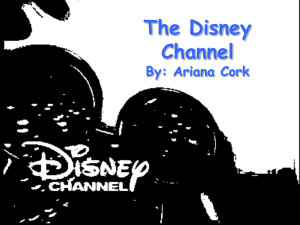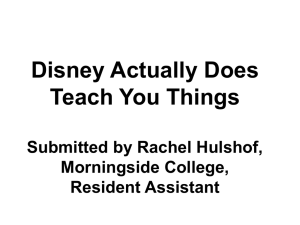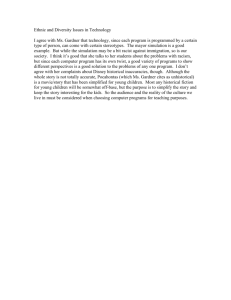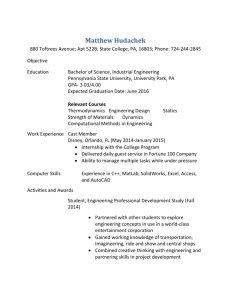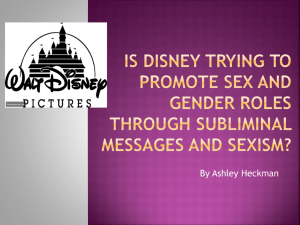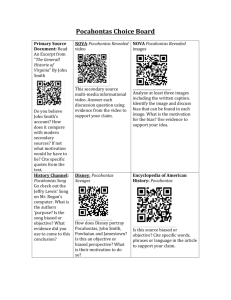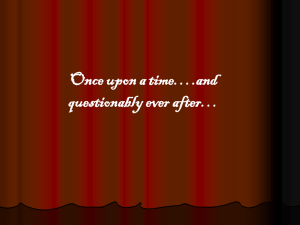Race and Culture in Disney Movies
advertisement
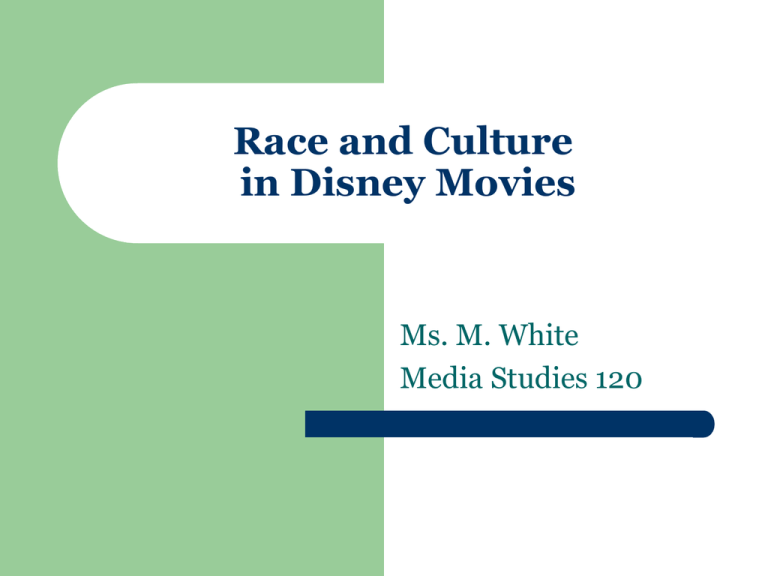
Race and Culture in Disney Movies Ms. M. White Media Studies 120 Aladdin Arabian Nights Aladdin Princess Jasmine, the only female character in Aladdin (1992), is a lot like Disney's other women. Racism But there is another very worrying thing about this movie, its racism. Listen to some of the songs, for example: "I come from a land.... where they cut off your ears if they don't like your face. It's barbaric, but hey, it's home." Look at the characters: The evil characters, like Jafar, look very Arabic. On the other hand, Aladdin, the hero, looks and sounds like a fresh-faced American boy: his skin is much paler, and he asks people to call him 'Al', an American name, not an Arabic name. Disney magic Of course, Disney does not intend to offend people that would be bad business. Most people who watch the movies are probably caught up in the Disney magic and don't notice these things. But that's the problem. One way in which Disney creates the magic is by using stereotypes that people respond to without thinking. Aladdin looks 'right' for a hero; Jafar looks 'right' for a villain. We don't think about it. The Lion King Mufasa! Mufasa! Mufasa! Racism & Stereotypes The Lion King does the same thing. The characters are animals, but their voices show racist stereotypes. Even though The Lion King takes place in Africa, two white American actors are used for the voice of Simba, the hero. However, the hyenas who are bad characters in the film, speak non-standard English and are played by actors like Whoopi Goldberg and Cheech Marin. The villain, Scar, suggests homosexuality. And, of course women (the lionesses) are weak and need a male hero: when Simba runs away, the lionesses cannot protect themselves from the evil Scar and must wait for years until Simba returns to save them. Pocohontas After The Lion King, Disney became interested in the idea of 'multiculturalism' and made Pocahontas in 1995. This movie mixes Disney's favorite story of the princess- in-love with a real story from Native American history. The problem of Disneyification That is a problem because Pocahontas was a real woman, and she was very different from the Pocahontas that Disney invented. To give only one example: in real life, Pocahontas was a child when she first met the 'hero' John Smith and there was no romance between them. When Pocahontas met Smith again years later, she called him 'father'. But there are even more serious problems with the Disney version of Pocahontas and the video follow-up, Pocahontas II. The movies ignore the real fate of both Pocahontas and her people. The first movie ends cheerfully with peace between the colonists and natives; in fact, many, many of the Powhatan Nation (Pocahontas' people) were later killed. As for the real Pocahontas, she was kidnapped and held hostage. She was forced to become a Christian and behave like a 'civilized' white woman. She was married to a colonist who believed that the civilization she grew up in was evil. Later, Pocahontas was taken to England, to help advertise the colony of Virginia. In England, she was homesick. She became ill and died before she could return to her homeland. None of this is in Disney's movie. And that is very worrying, because many people believed that they were learning about history when they watched Pocahontas. Neil Young & Pocohontas Neil Young Mulan Disney has done a similar thing with Mulan (1998), the story of a Chinese hero. The real Hua Mu-Lan lived so long ago that her story has become a Chinese legend - a legend that Disney has reinvented so that it fits the pattern of a young woman in love. Disney created Shang, a male hero for Mulan. He is her commanding officer. In the movie, Mulan is wounded in battle and everyone finds out that she is a woman. Her punishment is death but Shang cannot kill her, so he sends her away. After the war he comes to find her and marry her. Disney has done it again. Brave, kick-boxing Mulan does not look like Snow White but, in fact, the life of a Disney heroine has not changed very much. Men still have power over them (Shang quite literally decides whether Mulan will live or die); and the best thing that can happen to them is to marry the hero and live "happily ever after." Disney’s Mulan Bring Honor To Us All
